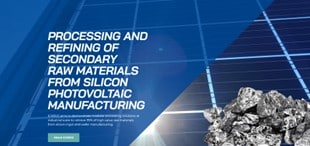Chemconserve in ICARUS
ChemConserve BV is an Utrecht-based Dutch company that commercializes recycling technologies and critical ra
In the field of Intellectual Property Rights (IPR) management, ChemConserve assists the project partners with licensing the technologies developed in the project and with drafting their business plans as part of the overall Exploitation Management.
In the past, ChemConserve participated also in similar projects with European funding, including REEcover, a project that ran from 2013 to 2016 focusing on the development of innovative technologies for the recovery of Rare Earth Elements (REEs) from electronic waste and mine tailings from the iron ore industry. ChemConserve participated in the project in the field of commercialization of the technologies and acted as a liaison with various industrial companies interested in the technologies. ChemConserve together with the University of Trondheim calculated the required CAPEX and OPEX and the resulting recovery of the rare earths, based on a detailed flow chart of the pilot scale processes, and estimated financials returns on various world market price scenarios for 3 rare earths, neodymium, dysprosium and praseodymium.
The key staff of ChemConserve involved in the ICARUS project is composed of Marco Pieterse, Co-founder of Chemconserve BV and responsible for project and business development and Kees Nederveen, second Co-founder and responsible for technology development and chemical trade, complemented by IP legal expert Mr. Sep Tunzi.
ChemConserve identifies and develops the potential for the recycling technologies created by the consortium, by doing market research and establishing a suitable commercialization structure, and, in the future, assisting in the negotiations of exploitation agreements with third parties interested in licensing and implementing ICARUS’ and directly related technologies.
The challenges related to its specific role are different:
- Intellectual Property Right Management: to develop a go-to-market strategy, ChemConserve, in close consultation with the consortium partners, advises on either patenting developed technologies or protecting them through trade secrets. The strategy begins with a thorough understanding of the target market. Chemconserve conducts extensive market research to identify potential customers, competitors, and emerging trends. Once this is done, we will assess the technologies to evaluate their readiness for the market. This assessment will look at technical feasibility, scalability, and potential use cases. Developing a successful go-to-market strategy goes beyond protection; it involves understanding the path for technology commercialization. We will work with consortium partners to define product development roadmaps, pricing strategies, and distribution channels.
- In addition, ChemConserve will organize workshops in close consultation with bifa (responsible for LCA development) and with dissemination partner Benkei for each pilot plant to gather information on the technologies’ development, so that it will be able to make more informed decision on the IPR strategy.
- Exploitation agreements: on basis of the recycling technologies developed within the consortium, ChemConserve will assist the partners by providing targeted market research, approaching potentially interested companies and finally with negotiations of exploitation agreements.
In order to understand the feasibility of commercializing the pilots’ technologies, ChemConserve conducted a patent search and developed a ‘patent landscape’ with a specific focus on the Asian markets where almost all IPR registration activity in silicon kerf recycling has been registered so far. The aim of this activity was to define a comprehensive categorizing framework in which to include only the relevant patents filed worldwide in the field of silicon kerf recycling and applications considered in ICARUS. This result will help in the definition of the future exploitation agreements, based on a sound understanding where there is most interest in these technologies.
Future activities will include the organization of workshops for each of the pilot plants, starting from Norway. From these workshops, ChemConserve together with Bifa from Augsburg wants to gather enough information to be able to start an informed market analysis and assist in the development of the best go-to-market strategy.




